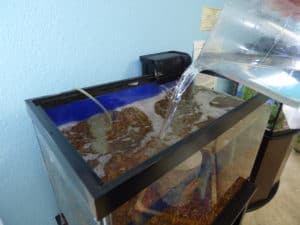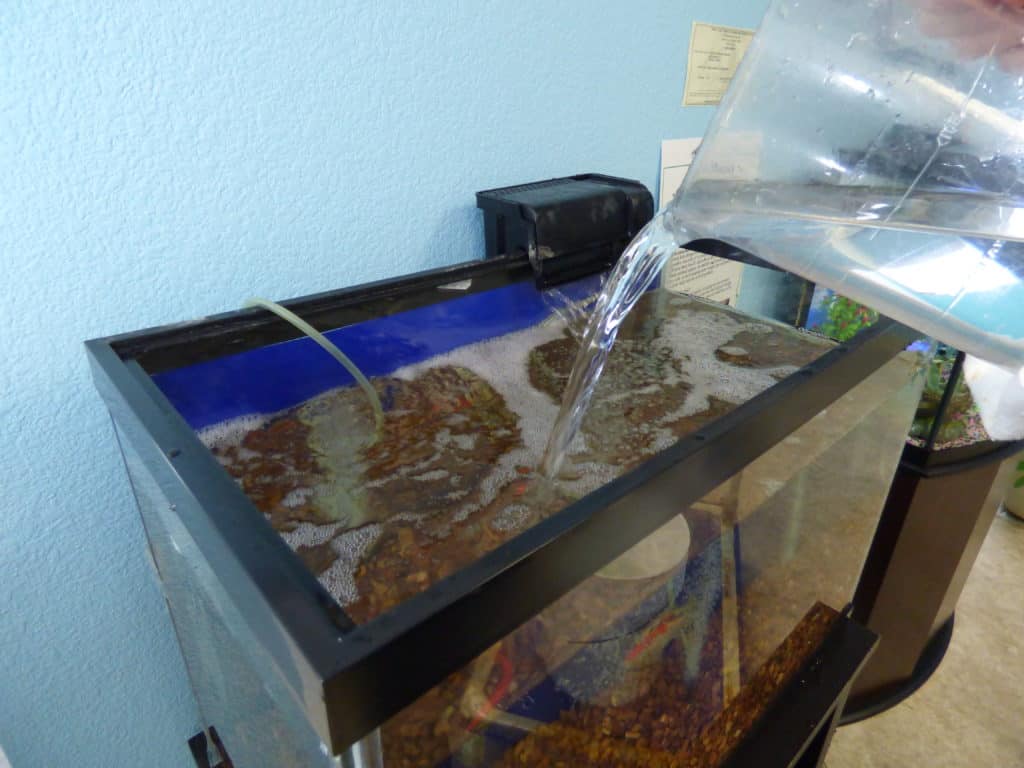When filling up your pond or tank, what is the best water source to use? For most systems, standard tap water is perfectly fine for most pet fish species. However, some fish are a bit more particular about their water and can get very ill if special attention is not applied to their source water. Learn which water source for fish tanks and ponds is best for your setup.

Types of Water Sources
Tap Water
Most fish tanks and ponds are filled with regular tap water. If your tap water is safe for your and your fuzzy pets, it is likely okay for your fish. Be sure to use a water conditioner regularly to remove any chlorine or chloramine that is added to your water to make it safe for consumption. Chlorine toxicity in fish is deadly and the most common cause of death in older pond fish. This occurs when someone leaves the hose running and gets distracted.
Well Water
Well sources tend to vary significantly more than tap water. It is highly recommended that all well owners get their water tested at least once a year, if not for their fishes’ safety, but also their family’s safety. Many municipalities will test well water for free. There is also the risk that your well might run dry. If this happens, be sure to have a backup plan to keep your fish happy. For large ponds, buying a truck of water has been the best option for many remote locations.
Bottled Water
For small systems, bottled water can be a fine option. However, not all bottled water is created the same! “Spring,” “filtered” or “distilled” may mean many different things. Usually distilled water is NOT good for fish. This option removed all the beneficial buffers, therefore setting your kH to ZERO and setting your tank up for Old Tank Syndrome. The best bottled water for fish tanks is usually spring water. When in doubt, test your bottle before you add it to your tank!
Bottled “fish water” at the pet stores is a COMPLETE WASTE OF MONEY. It is no different than the bottled water at the grocery store and costs 5 times as much. JUST DON’T BUY IT!
Reverse Osmosis Water
Reverse Osmosis water, commonly called “RO” water, works as a very high powered water filter, using a very fine screen to remove only pure water particles. These units are widely available and good for owners with questionable tap water. However, just like distilled water, RO water is just plain water. It has a kH of ZERO also, therefore the only way to use it in a fish tank is to reverse engineer the kH and gH. There are many commercial additives available to get your water to the correct levels. RO water is used frequently for finicky fish systems that have very specific water parameter requirements. This is certainly not the case for most pet fish.
Best Water Source for Fish Tanks and Ponds
Best Water Source for Fish Tank
For fish tanks, it really depends on how large your tank is and what species you keep. Most pet fish species, such as goldfish, mollies or tropicals, are just fine in most tap water. Our area of California has a slightly higher pH, around 8.0 to 8.5, but this is perfectly fine for all pet fish. Remember, when it comes to pH, consistency is key!
If you cannot use your tap water and your tank is small (less than 10 gallons), we recommend you try bottled spring water. This is readily available in most grocery stores and can provide excellent water for your fish. It is not recommended that you switch up brands frequently unless you check your parameters first.
Best Water Source for Fish Pond
For large ponds, unfortunately, you are likely at the mercy of your tap water. All of the other options will not give you the volume that your tap can provide. If your tap water is not safe for fish, you shouldn’t have a pond. Always remember to add your water conditioner! There is no treatment for fish subject to chlorine toxicity and it has a very high mortality.

